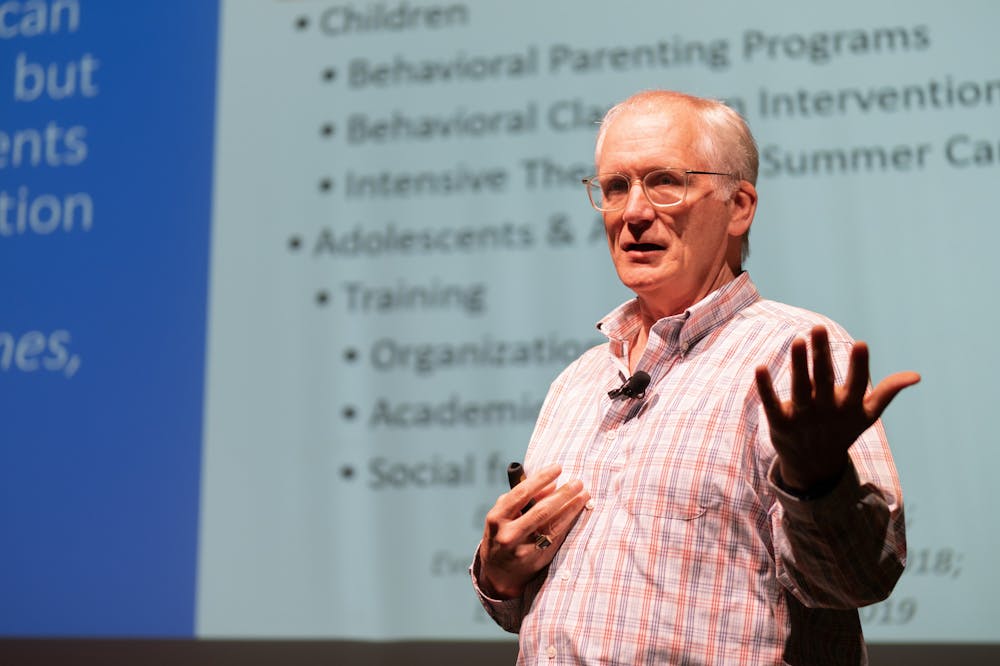Ohio University’s own Science Cafés, which take place monthly in Baker Theater, are opportunities to learn something new about a topic that does not commonly come up in a day-to-day conversation. Steven Evans and Julie Owens, both current psychology professors at OU, spoke at the event on March 8 to bust many of the common myths surrounding Attention Deficit/Hyperactivity Disorder, or ADHD.
In the playful spin on the popular TV show “Mythbusters,” Evans and Owens wanted to educate students on many of the common myths that come up when talking about ADHD in a more audience-engaging environment. Roxanne Malé-Brune, the senior director of grant development and projects in the research division, explained why events like “The ADHD Collection” are so different.
“Imagine you have a content expert and normally they would go on stage and they would give a lecture, and at the end of the lecture, you get to ask a few questions, and you learn something; Science Cafés aren’t that,” she said. “What it is, is that you have this content expert, but the audience asks questions from nearly the very beginning. So even though they have an idea of what they're going to talk about, the audience’s questions sort of lead you into various areas, and so it becomes a real discussion.”
The Science Cafés are hosted by the research division and Sigma Xi, the National Honors Society for Science. Each expert host and topic is carefully selected and molded around a more engaging and interactive experience. Additionally, free coffee was provided for the first 50 attendees and free T-shirts were provided to students who asked questions.
During the Science Café, a number of common myths were addressed to the audience. Members were to raise their hand for whether they believed it to be a myth or a fact. Some common misconceptions of ADHD included medication being the only solution for the disorder and the use of accommodations, such as extended time on tests, which can actually often hurt students’ results as opposed to helping them.
Dr. Evans received a Ph.D. in clinical psychology after working as an elementary school teacher. He claimed that working as a teacher guided his career into making a difference for many children and adolescents with emotional behavior problems through his research on ADHD.
“The impact of misinformation on society has just been incredible and just incredibly unfortunate,” said Evans. “I think that extends to various disorders including ADHD in particular, there seems to be more politics around ADHD than some other disorders. Our hope is that by clarifying some of these myths … we can maybe allow some people to make better choices about what kind of help they pursue, help parents make better choices about what they advocate for their children and hopefully for practitioners to help them understand the real benefits and costs associated with the choices they choose to provide.”
In addition to being professors, Evans and Owens are co-directors of the Center for Intervention Research in Schools and described ways students can get involved with activities through the Center.
Maddy Morris, a freshman studying social work, was impressed by the professors' knowledge of the subject and their ability to answer questions from the audience.
“This is the first time I’ve interacted (with them),” said Morris. “They know their stuff, not that I thought they wouldn’t, but they knew more than I was thinking, they went in depth.”
Morris would recommend attending a Science Café to a friend in the future.
The complete event is available on YouTube for anyone who may have missed the event but wanted to attend.
With many myths about something as important as behavior disorders becoming more common as time goes on, learning the difference between fact and fiction has never been more important. Taking the time to learn something new can truly benefit those affected by something like ADHD or allow someone to be more accepting and inclusive.
“Sometimes our perspectives are skewed by what we know,” said Malé-Brune. “Having somebody tell you, ‘Well yes, but maybe you need to know more,’ I think allows us to broaden our perspective and to be more accepting and to be more inclusive. This café is for us to have a really interesting and honest dialogues, so we are more able to accommodate others and to welcome others and to ensure that they can be their better selves.”






